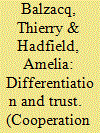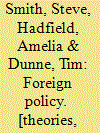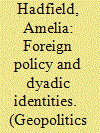|
|
|
Sort Order |
|
|
|
Items / Page
|
|
|
|
|
|
|
| Srl | Item |
| 1 |
ID:
116687


|
|
|
|
|
| Publication |
2012.
|
| Summary/Abstract |
One recent but major policy occurrence in Justice and Home Affairs - the Treaty of Prüm (2005) - has developed within the framework of differentiated integration, thus reopening the debate over the impact of flexibility on EU integration, what causes it, and whether it should be sought by Member States at all. Whatever the consensus, the debate itself demonstrates that the very idea of differentiated integration deserves a renewed attention today ultimately because it affects, in one way or another, the performance of the EU. This article presents a critical analysis of the practice of differentiation in Justice and Home Affairs, by examining its forms, principles and effects. It discusses the literature on the subject, emphasizing the complexity of flexible integration, but reaches different conclusions. Thus, in contrast to the dominant argument, we argue that differentiation is not necessarily about deepening and/or widening EU integration. It is also, and sometimes primarily, about power and interests, two major elements that feed mistrust among Member States. In fact, we demonstrate that mistrust can cause poor differentiation. Moreover, in the absence of trust among Member States, flexibility might contribute to sub-optimal policies. Based on past research and interviews, we substantiate our claim by investigating the driving factors, rationales and consequences of the Treaty of Prüm on the institutionalization of a EU area of Freedom, Security and Justice.
|
|
|
|
|
|
|
|
|
|
|
|
|
|
|
|
| 2 |
ID:
150532


|
|
|
|
|
| Summary/Abstract |
This article argues that strategic culture, long consigned to the margins of broader, more substantial IR theories, offers a novel mode by which to explore recent developments in EU-Russia energy relations. Approaching seminal strategic policies from the perspective of institutionalised norms and cultural value-sets, strategic culture explores the power of the past and its ability to produce and influence national attitudes in governments and societies. This enables analyses of strategic energy relations between actors like the EU and Russia to move beyond obvious polarities to nuanced insights about the national value sets by which energy security is itself rendered strategic. Beginning with the individual strategic cultures of both the EU and Russia within the area of contemporary energy security policies, the article then appraises the range of bilateral EU-Russia energy security policies, suggesting that in many ways, these shared policies constitute a sector-specific strategic energy culture that includes both the EU and Russia. Areas of ongoing intransigence and policy convergence in EU-Russia energy security approaches constitute the case studies, illustrating that both sides are essentially motivated toward the same goals of energy security, market prosperity and actor-based prestige, but on the basis of vastly different visions, using widely diverse modes of implementation, and with dissimilar standards of evaluation. The analysis then appraises whether this co-constituted area is progressive or regressive in terms of the cooperation or conflict generated between the two sides, concluding that a basis of acknowleged commonalities – made available through strategic culture perspectives – both sides retain the impetus to cooperate to the point of complete agreement on some areas, whilst simultaneously remaining in conflict to the point of aggression in others.
|
|
|
|
|
|
|
|
|
|
|
|
|
|
|
|
| 3 |
ID:
081589


|
|
|
|
|
| Publication |
Oxford, Oxford University Press, 2008.
|
| Description |
xxii, 442p.
|
| Standard Number |
9780199215294
|
|
|
|
|
|
|
|
|
|
|
|
Copies: C:1/I:0,R:0,Q:0
Circulation
| Accession# | Call# | Current Location | Status | Policy | Location |
| 053283 | 327.101/SMI 053283 | Main | On Shelf | General | |
|
|
|
|
| 4 |
ID:
075099


|
|
|
|
|
| Publication |
2006.
|
| Summary/Abstract |
The Common Foreign and Security Policy (CFSP) is a foreign policy tool that continues to defy easy description. It is a focal point of intergovernmental forces protecting their foreign policy-making power and also a forum for increasingly supranational coordination of all member states on EU third-party issues that has bestowed a quality of 'actorness' upon the EU. Introducing the role of identity to judge the national and trans-national tensions inherent in EU foreign policy making, the CFSP is seen to operate as a locale of dyadic identity construction, juxtaposing national and collective forms of self-reference in an effort to produce workable outputs and lend consistency to EU actorness. Following the existential questioning of a post-Constitution EU, common foreign policy making may require alternative approaches to the confines of the CFSP. The use of 'enhanced cooperation' encouraging groups of states to guide EU foreign policy is a possible remedy to the quantitative problems inherent in coordinating twenty-five policy stances and the qualitative attributes that reveal national identity as deeply connected to foreign policy practices.
|
|
|
|
|
|
|
|
|
|
|
|
|
|
|
|
|
|
|
|
|